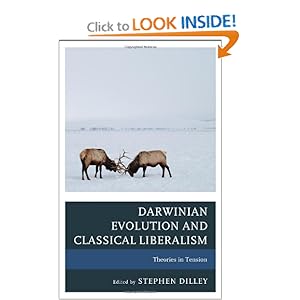 Further to “A response to Sal’s ‘Creationist support of eugenics and genocide in the past’”—for me, this was the riddle:
Further to “A response to Sal’s ‘Creationist support of eugenics and genocide in the past’”—for me, this was the riddle:
Why did eugenicists think they could do better than nature in eliminating the unfit? That is, if you believed that half your neighbours were unfit to live or have children, wouldn’t the logical course be to do nothing and let nature take its course?
Political scientist John West helpfully provides an answer in his essay, “Darwinism, Economic Liberty, and Limited Government,” in Stephen Dilley (ed.), Darwinian Evolution and Classical Liberalism: Theories in Tension (Lexington Books, 2013):
By the early 1900s, eugenists [eugenicists] believed that social welfare efforts had developed sufficiently to make Darwin’s worst fears a reality, which made the imposition of eugenic restrictions on human breeding a necessity.
Sometimes it is suggested that eugenists were not really Darwinists because they thought natural selection was not up to the job and needed to be replaced by the artificial selection of eugenics. But that misunderstands the eugenists’ ideology. They did not think natural selection was insufficient so long as it was allowed to do its work. That was the problem in their view: Civilized societies did not let natural selection work. Time and again, eugenists lamented that modern society was destroying itself through its continual efforts to counteract the law of natural selection.
Edwin Conklin, Professor of Biology at Princeton University, observed that while nature may still kill off the worst defectives, “nevertheless a good many defectives survive in modern society and are capable of reproduction who would have perished in more primitive society before reaching maturity” (Conklin 1915, 539–40). Such defectives survive “in the most highly civilized States” because they “are preserved by charity and … are allowed to reproduce … thus natural selection the great of of evolution and progress, is set at naught.”(p. 127)
Note that Conklin sees evolution as a law that leads to progress.
Some eugenists even invoked natural selection to criticize efforts to reduce infant mortality by improving sanitation, hygiene, and prenatal care. According to these critics, such efforts merely postponed the deaths of many defective babies, and those defective babies who did survive long-term would drag the race down by perpetuating “another strain of weak heredity, which natural selection would have cut off ruthlessly in the interests of race betterment. ” Hence, “from a strict biological viewpoint” efforts to reduce infant mortality by improving environmental influences were “often detrimental to the future of the race.” (Popenoe and Johnson 1932, 517–19) (pp. 127–28)
Note that natural selection is here supposed to be a force acting “in the interests of race betterment.”
And so on. Eugenists embraced Darwin’s theory passionately and thought that compulsory sterilization was a more humane application of it than a contemplated return to the law of the jungle. As West concludes,
Eugenics may not have been the only possible application of Darwin’s theory; but it was certainly logicially connected to Darwinism. Far from a distortion of Darwin’s ideas, it was a culmination of the warnings issued by Darwin himself in The Descent of Man, and that is how eugenists understood it, especially in the United States. (pp. 127–28)
To the extent that eugenicists believed that they were evolved animals themselves, naturally selected for survival, they may have supposed that they could easily act for mere nature, as the hyena and mosquito do.
Note: No news service yesterday due to IP issues in Canada.
